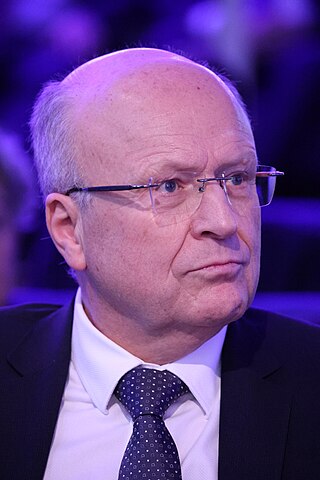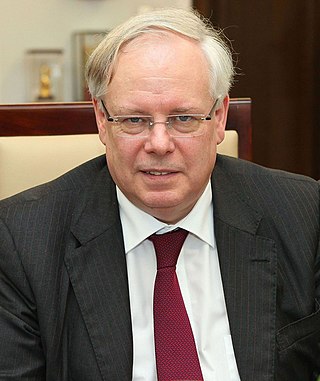
The Benelux Union or Benelux is a politico-economic union and formal international intergovernmental cooperation of three neighbouring states in Western Europe: Belgium, the Netherlands, and Luxembourg. The name is a portmanteau formed from joining the first few letters of each country's name and was first used to name the customs agreement that initiated the union. It is now used more generally to refer to the geographic, economic, and cultural grouping of the three countries.

The European Commission (EC) is the primary executive arm of the European Union (EU). It operates as a cabinet government, with a number of members of the Commission corresponding to two thirds of the number of Member States, unless the European Council, acting unanimously, decides to alter this number. The current number of Commissioners is 27, including the President. It includes an administrative body of about 32,000 European civil servants. The commission is divided into departments known as Directorates-General (DGs) that can be likened to departments or ministries each headed by a Director-General who is responsible to a Commissioner.

The European Court of Justice (ECJ), formally just the Court of Justice, is the supreme court of the European Union in matters of European Union law. As a part of the Court of Justice of the European Union, it is tasked with interpreting EU law and ensuring its uniform application across all EU member states under Article 263 of the Treaty of the Functioning of the European Union (TFEU).

The Christian Social People's Party is the largest political party in Luxembourg. The party follows a Christian democratic and conservative ideology and has been described as centre to centre-right. Furthermore, akin to most parties in Luxembourg, it is strongly pro-European. The CSV is a member of the Christian Group, European People's Party, and the Centrist Democrat International.

The College of Europe is a post-graduate institute of European studies with its main campus in Bruges, Belgium, and additional newer campuses in Warsaw and Tirana.

The European Public Prosecutor's Office (EPPO) is an independent body of the European Union (EU) with a juridical personality, established under the Treaty of Lisbon between 24 of the 27 states of the EU following the method of enhanced cooperation. The EPPO was established as a response to the need for a prosecutorial body to combat crimes affecting the financial interests of the European Union (EU). The idea of establishing the EPPO gained momentum with a legislative proposal put forth by the European Commission in 2013. After lengthy negotiations and discussions within the European Council, the European Parliament, and Member States, Regulation (EU) 2017/1939 was adopted on October 12, 2017, formalizing the creation of the EPPO. The EPPO Regulation is the EPPO's legal basis, as it outlines the objectives, structure, jurisdiction, and operational procedures. Directive (EU) 2017/1371, also known as the PIF Directive, specifies the criminal offences affecting the EU's financial interest falling under the EPPO's jurisdiction. The EPPO's primary mandate is to investigate and prosecute offences such as fraud, corruption, and money laundering that harm the financial interests of the EU, as defined by the PIF Directive. The EPPO represents a significant step towards a more integrated and effective approach to combating transnational crimes within the EU, fostering collaboration and coordination among member states to protect the Union's financial resources. As an independent EU body, the EPPO plays a crucial role in ensuring the rule of law and safeguarding the integrity of the EU's financial system. The EPPO is based in Kirchberg, Luxembourg City alongside the Court of Justice of the European Union (CJEU) and the European Court of Auditors (ECA).

Luc Frieden is a Luxembourgish politician and lawyer who is the 25th prime minister of Luxembourg since November 2023. A member of the Christian Social People's Party (CSV), he held numerous cabinet positions in the Luxembourgish government between 1998 and 2013, notably serving as the minister for the Treasury and Budget during the transition from the Franc to the Euro and as minister of Finance during the European debt crisis. Frieden was president of the Luxembourgish Chamber of Commerce and Eurochambres, the business federation of European Chambers of Commerce and Industry.

Koen Lenaerts, Baron Lenaerts is a Belgian jurist and the President of the Court of Justice of the European Union. He is also a Professor of European Law at the Katholieke Universiteit Leuven and was a member of the Coudenberg group, a Belgian federalist think tank.

Robert Lecourt was a French politician and lawyer, judge and the fourth President of the European Court of Justice. He was born in Pavilly and died in Boulogne-Billancourt.

Robert John Reed, Baron Reed of Allermuir, is a Scottish judge who has been President of the Supreme Court of the United Kingdom since January 2020. He was the principal judge in the Commercial Court in Scotland before being promoted to the Inner House of the Court of Session in 2008. He is an authority on human rights law in Scotland and elsewhere; he served as one of the UK's ad hoc judges at the European Court of Human Rights. He was also a Non-Permanent Judge of the Court of Final Appeal of Hong Kong.

The Court of Justice of the European Union (CJEU) is the judicial branch of the European Union (EU). Seated in the Kirchberg quarter of Luxembourg City, Luxembourg, this EU institution consists of two separate courts: the Court of Justice and the General Court. From 2005 to 2016, it also contained the Civil Service Tribunal. It has a sui generis court system, meaning 'of its own kind', and is a supranational institution.
Verica Trstenjak is a Slovenian Doctor of Laws and Professor of European Law based in Vienna, Austria. From 2006 to 2012 she has been an Advocate General at the Court of Justice of the European Union in Luxembourg (CJEU), from 2004 to 2006 judge of the General Court.

Dean Spielmann is a Luxembourgish lawyer and a former president of the European Court of Human Rights. He has been a judge of the European Court of Human Rights in respect of Luxembourg since 2004, president of the Fifth Section of the Court since 2011 and was elected vice-president and then, shortly afterwards, president in 2012. He is also a member of the Grand Ducal Institute of Luxembourg and has held academic posts at the universities of Luxembourg, Nancy and Louvain.
Marc Jaeger is a jurist from Luxembourg, and a judge at the General Court of the EU. He was appointed in 1996. In 2007, he became President of the court.

Egils Levits is a Latvian politician, lawyer, political scientist and jurist who served as the tenth president of Latvia from 2019 to 2023. He was a member of the European Court of Justice from 2004 to 2019.

Katarina Barley is a German politician and lawyer who has been a Member of the European Parliament since 2019, serving as one of its Vice-Presidents. She served as Federal Minister of Justice and Consumer Protection in the fourth Cabinet of Angela Merkel. Prior to that, she had served as Federal Minister of Family Affairs, Senior Citizens, Women and Youth and since 28 September 2017 also as the acting Federal Minister of Labour and Social Affairs, both until 14 March 2018.
The Statute of the Court of Justice of the European Union contains the main EU law rules on how the Court of Justice of the European Union should function. Founded in 1951, The CJEU sits in Luxembourg, and it operates in two sections: The European Court of Justice (ECJ) and the General Court (GC). A direct component of the EU, the five main goals of the CJEU are:

Christophe Hansen is a Luxembourgish politician belonging to the Christian Social People's Party (CSV), of which he is Secretary-General.
Síofra O’Leary is an Irish lawyer and judge who served as president of the European Court of Human Rights from November 2022 to July 2024 and as a judge of the European Court of Human Rights since July 2015. She previously served as a vice-president of the European Court of Human Rights in 2022.
Anthony Michael Collins is an Irish lawyer who is an Advocate General of the European Court of Justice. He previously served as was Judge of the General Court of the European Union from 2013 and 2021.















